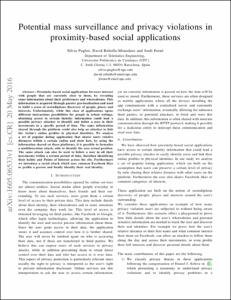Mostra el registre d'ítem simple
Potential mass surveillance and privacy violations in proximity-based social applications
| dc.contributor.author | Puglisi, Silvia |
| dc.contributor.author | Rebollo Monedero, David |
| dc.contributor.author | Forné Muñoz, Jorge |
| dc.contributor.other | Universitat Politècnica de Catalunya. Departament d'Enginyeria Telemàtica |
| dc.date.accessioned | 2016-11-07T11:35:00Z |
| dc.date.available | 2016-11-07T11:35:00Z |
| dc.date.issued | 2016 |
| dc.identifier.citation | Puglisi, S., Rebollo-Monedero, D., Forne, J. Potential mass surveillance and privacy violations in proximity-based social applications. A: IEEE International Conference on Trust, Security and Privacy in Computing and Communications. "2015 IEEE Trustcom/BigDataSE/ISPA". Helsinki: IEEE Press, 2016, p. 1045-1052. |
| dc.identifier.uri | http://hdl.handle.net/2117/93002 |
| dc.description.abstract | Proximity-based social applications let users interact with people that are currently close to them, by revealing some information about their preferences and whereabouts. This information is acquired through passive geo-localisation and used to build a sense of serendipitous discovery of people, places and interests. Unfortunately, while this class of applications opens different interactions possibilities for people in urban settings, obtaining access to certain identity information could lead a possible privacy attacker to identify and follow a user in their movements in a specific period of time. The same information shared through the platform could also help an attacker to link the victim’s online profiles to physical identities. We analyse a set of popular dating application that shares users relative distances within a certain radius and show how, by using the information shared on these platforms, it is possible to formalise a multilateration attack, able to identify the user actual position. The same attack can also be used to follow a user in all their movements within a certain period of time, therefore identifying their habits and Points of Interest across the city. Furthermore we introduce a social attack which uses common Facebook likes to profile a person and finally identify their real identity. |
| dc.format.extent | 8 p. |
| dc.language.iso | eng |
| dc.publisher | IEEE Press |
| dc.rights.uri | http://creativecommons.org/licenses/by-nc-nd/3.0/es/ |
| dc.subject | Àrees temàtiques de la UPC::Informàtica::Seguretat informàtica |
| dc.subject.lcsh | Internet--Security measures |
| dc.title | Potential mass surveillance and privacy violations in proximity-based social applications |
| dc.type | Conference lecture |
| dc.subject.lemac | Seguretat informàtica |
| dc.contributor.group | Universitat Politècnica de Catalunya. ISG - Grup de Seguretat de la Informació |
| dc.identifier.doi | 10.1109/Trustcom.2015.481 |
| dc.rights.access | Open Access |
| local.identifier.drac | 18544228 |
| dc.description.version | Postprint (author's final draft) |
| local.citation.author | Puglisi, S.; Rebollo-Monedero, D.; Forne, J. |
| local.citation.contributor | IEEE International Conference on Trust, Security and Privacy in Computing and Communications |
| local.citation.pubplace | Helsinki |
| local.citation.publicationName | 2015 IEEE Trustcom/BigDataSE/ISPA |
| local.citation.startingPage | 1045 |
| local.citation.endingPage | 1052 |


